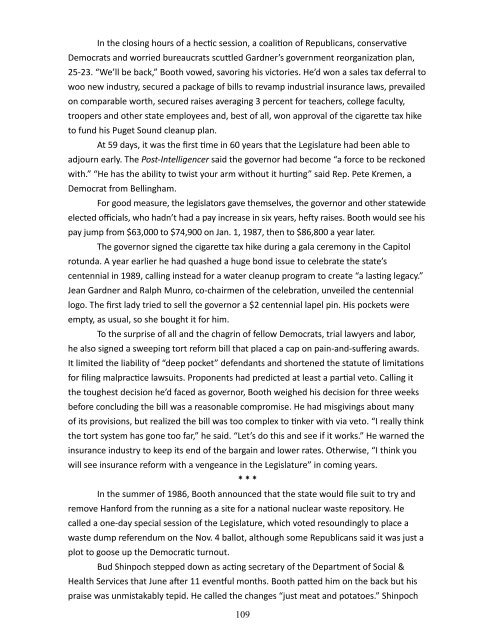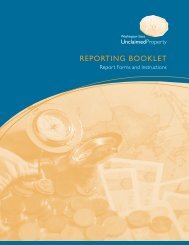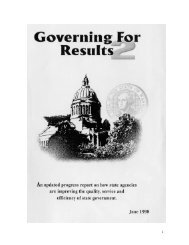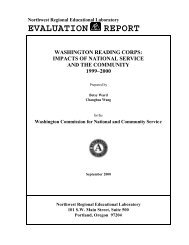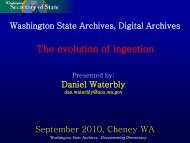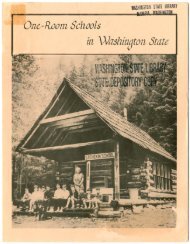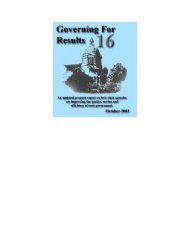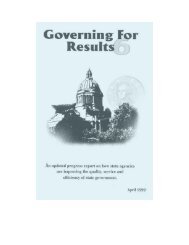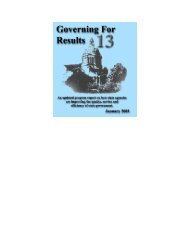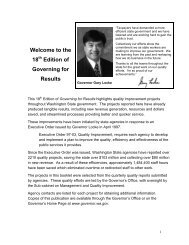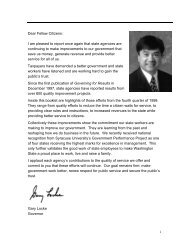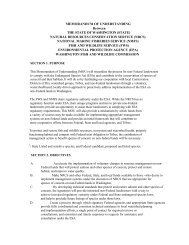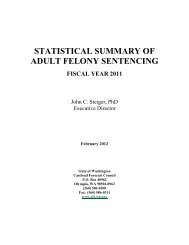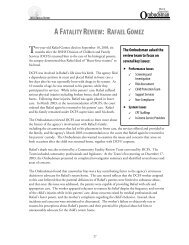BOOTH WHO? - Washington State Digital Archives
BOOTH WHO? - Washington State Digital Archives
BOOTH WHO? - Washington State Digital Archives
You also want an ePaper? Increase the reach of your titles
YUMPU automatically turns print PDFs into web optimized ePapers that Google loves.
In the closing hours of a hectic session, a coalition of Republicans, conservative<br />
Democrats and worried bureaucrats scuttled Gardner’s government reorganization plan,<br />
25-23. “We’ll be back,” Booth vowed, savoring his victories. He’d won a sales tax deferral to<br />
woo new industry, secured a package of bills to revamp industrial insurance laws, prevailed<br />
on comparable worth, secured raises averaging 3 percent for teachers, college faculty,<br />
troopers and other state employees and, best of all, won approval of the cigarette tax hike<br />
to fund his Puget Sound cleanup plan.<br />
At 59 days, it was the first time in 60 years that the Legislature had been able to<br />
adjourn early. The Post-Intelligencer said the governor had become “a force to be reckoned<br />
with.” “He has the ability to twist your arm without it hurting” said Rep. Pete Kremen, a<br />
Democrat from Bellingham.<br />
For good measure, the legislators gave themselves, the governor and other statewide<br />
elected officials, who hadn’t had a pay increase in six years, hefty raises. Booth would see his<br />
pay jump from $63,000 to $74,900 on Jan. 1, 1987, then to $86,800 a year later.<br />
The governor signed the cigarette tax hike during a gala ceremony in the Capitol<br />
rotunda. A year earlier he had quashed a huge bond issue to celebrate the state’s<br />
centennial in 1989, calling instead for a water cleanup program to create “a lasting legacy.”<br />
Jean Gardner and Ralph Munro, co-chairmen of the celebration, unveiled the centennial<br />
logo. The first lady tried to sell the governor a $2 centennial lapel pin. His pockets were<br />
empty, as usual, so she bought it for him.<br />
To the surprise of all and the chagrin of fellow Democrats, trial lawyers and labor,<br />
he also signed a sweeping tort reform bill that placed a cap on pain-and-suffering awards.<br />
It limited the liability of “deep pocket” defendants and shortened the statute of limitations<br />
for filing malpractice lawsuits. Proponents had predicted at least a partial veto. Calling it<br />
the toughest decision he’d faced as governor, Booth weighed his decision for three weeks<br />
before concluding the bill was a reasonable compromise. He had misgivings about many<br />
of its provisions, but realized the bill was too complex to tinker with via veto. “I really think<br />
the tort system has gone too far,” he said. “Let’s do this and see if it works.” He warned the<br />
insurance industry to keep its end of the bargain and lower rates. Otherwise, “I think you<br />
will see insurance reform with a vengeance in the Legislature” in coming years.<br />
* * *<br />
In the summer of 1986, Booth announced that the state would file suit to try and<br />
remove Hanford from the running as a site for a national nuclear waste repository. He<br />
called a one-day special session of the Legislature, which voted resoundingly to place a<br />
waste dump referendum on the Nov. 4 ballot, although some Republicans said it was just a<br />
plot to goose up the Democratic turnout.<br />
Bud Shinpoch stepped down as acting secretary of the Department of Social &<br />
Health Services that June after 11 eventful months. Booth patted him on the back but his<br />
praise was unmistakably tepid. He called the changes “just meat and potatoes.” Shinpoch<br />
109


